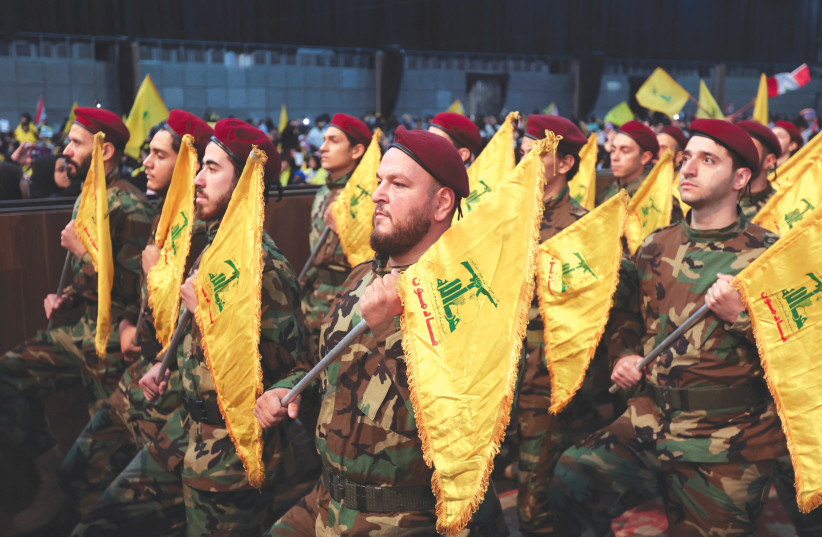Hezbollah Secretary-General Hassan Nasrallah should not bank on a civil war breaking out in Israel, Prime Minister Benjamin Netanyahu told his cabinet on Sunday as he dismissed the idea that the internal protests over his proposed judicial reforms could turn violent.
“Don’t count on a civil war. It will not happen. It will not happen because we are indeed brothers,” Netanyahu told the government prior to its weekly meeting.
He spoke amid growing protests against his government’s judicial overhaul program and rising concern from Western allies, including the US, that the reforms would weaken Israeli democracy.
Nasrallah in a speech last week highlighted the internal turmoil as an indication that Israeli society was imploding.
“What Nasrallah does not understand is that we are a living democracy. In a democracy, there are differences of opinion and debates. Sometimes there is disagreement, and when it is necessary, there are decisions. There will be no civil war because we always remember that we have fought shoulder to shoulder to defend our state and build our land,” Netanyahu said.

Netanyahu asks Israelis to dial down rhetoric
He asked Israelis to dial down the rhetoric against the reforms, particularly among those who are talking about bloodshed.
“It is precisely against the backdrop of the expectations of our enemies, expectations of destruction and bloodshed; that talk of blood in the streets must stop. The flames need to be lowered. The mood needs to be calmed. This is the clear call that I am making from here and I expect all public leaders to say these clear words,” Netanyahu said.
“I am pleased to disappoint our enemies and also reassure our friends: Israel is, and will remain, a strong, vibrant and independent democracy.”
But the United States has remained concerned with US President Joe Biden and US Secretary of State Antony Blinken taking the rare move in the last weeks of expressing their concern publicly.
US Ambassador to Israel Tom Nides also called on Israel to slow down, both in comments he made to a CNN podcast The Axe File last week and to the Conference of Presidents of Major American Jewish Organizations that met in Jerusalem on Sunday night.
“What binds us [Israel and the United States] together is this love of democracies and the love of institutions, this is how we are able to defend Israel in the UN, which we do time and time again,” he said.
As a friend of Israel, Nides said, adding that he believed the US has the credibility of “being a really good friend” the United States can and does “express some views.”
The United States, Nides said, believes "in building some consensus, I made the comment about pumping the brakes, slow down and try to build consensus.”
He explained that he is not offering advice on the details of the plan such as “how Israelis pick their supreme court” but he has spoken out on the need for it to be a broad-based process.
Israeli right-wing politicians expressed their frustration at Nides for interfering in Israel’s internal domestic affairs.
Finance Minister Bezalel Smotrich said that Israel does not interfere in US domestic affairs and expects the same consideration from Washington.
“I can reassure the US ambassador that a major part of the plan was derived from the US judicial system and that the elected officials there have a decisive influence on the selection of the supreme judges.
“It works in the USA, it works in many countries in the world, and it is the right thing for the State of Israel,” he said.
Diaspora Affairs Minister Amichai Chikli retorted in an interview on Reshet Bet, "Slam the breaks yourself and mind your own business," the Likud minister said. "We'd be happy to debate with you in international or security affairs, but respect our democracy.”
Separately Netanyahu spoke at the weekly cabinet against Iran’s unceasing aggression against Israel and Israeli-based targets.
“Last week, Iran again attacked an oil tanker in the Persian Gulf and struck at the international freedom of navigation,” Netanyahu said.
The prime minister spoke after an attack on the Liberian-flagged Campo Square was confirmed on Saturday by the ship’s captain, who said it was lightly damaged by an airborne object on February 10 while sailing through the Arabian Sea.
Shipping databases linked the tanker to Zodiac Maritime, which is controlled by Israeli shipping magnate Eyal Ofer.
Regional defense and security sources have said they suspected the assault was carried out by Iran, which did not comment on the incident.
Tehran has rejected accusations it was behind similar attacks in the past few years.
British maritime security company Ambrey Intelligence said unmanned aerial systems had attacked two tankers and one bulk carrier in the Arabian Sea, and assessed that Tehran had mounted the attack. Two of the merchant vessels were Israeli-owned and one was Emirati, it said.
Netanyahu at the cabinet meeting also spoke out against Iran’s attack on an American base in Syria.
“Iran continues to send deadly weapons that attack masses of innocent civilians far from its borders,” he said. “We will not allow Iran to obtain nuclear weapons and we will not allow it to entrench on our northern border. We are doing – and will do – everything to defend our people and we are responding forcefully to the attacks against us.”
Separately, he said that over the weekend, he authorized National Security Minister Itamar Ben-Gvir to form and lead “a special task force to fight against those who incite to murderous acts against us.
“He will be supported by investigators, police officers and prosecutors, in full coordination with the Justice Ministry, and with the participation of... the IDF and the National Cyber Directorate,” Netanyahu said.
Reuters contributed to this report.
